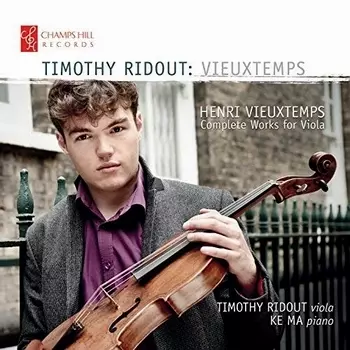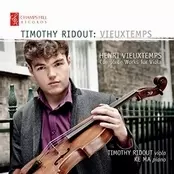Timothy Ridout: Vieuxtemps - Electronic
CHRCD130-E
- About
Artist(s):
Henri Vieuxtemps: Complete works for viola
Winner of the 2014 Cecil Aronowitz International Viola Competition, Timothy Ridout, joins together with his pianist duo partner, Ke Ma, to record his debut CD with Champs Hill Records.
This disc, which is the result of Timothy’s success at the CAIVC, presents the complete Viola works of Henri Vieuxtemps and includes two sonatas, small virtuoso gems and an Etude.
Timothy Ridout says of the disc: “Henri Vieuxtemps was one of the greatest violin virtuosi of the 19th century, and as a boy was compared to Paganini, though his compositions often neglected. I believe this is largely due to the fact that he is thought of as a composer solely for the violin, writing music filled with pyrotechnics. However this isn’t true. Vieuxtemps also loved the viola, and it is in his viola works that his lyrical, operatic style is most apparent.”
Born in London in 1995, Timothy studied at the Royal Academy of Music with Martin Outram, graduating with the Queen’s Award Excellence. He went on to the Kronberg Academy in Germany studying with Nabuko Imai, Tabea Zimmerman and Lawrence Power.
Ke Ma also studies at Royal Academy of Music under the tutelage of Professor Christopher Elton. During her studies, she won numerous prestigious international competitions such as the Shenzhen International Piano Concerto Competition (2014) and the 18th Concours International de Piano de la ville de Maisons-Laffitt in France (2016).
- Sleeve Notes
Although the viola can boast a distinguished line of composer supporters – including Bach, Mozart, Beethoven, Paganini, Berlioz, Vieuxtemps, Hindemith and Britten – it is only during the last half-century that it has really come into its own as a solo instrument. The viola possesses a unique voice that extends subtly from a gloriously dark, 'woody' lower register to a plangent intensity in its upper range. It is an instrument that only gives of itself to a select few. It does not respond kindly to force, but prefers to be gently coaxed into action. Attempts to submit the viola to the spiccato acrobatics, high bow pressure and vibrato intensity of the violin, or the stratospheric fingerboard intensity of the cello are almost invariably doomed to failure. The viola has an imperious nobility all its own, quite different to the chameleon-like, neurotic changeability of its immediate string cousins.
One of the few 19th-century violin virtuosi worthy to be mentioned in the same breath as Paganini, Wieniawski, Ernst and Sarasate, Henri Vieuxtemps was a prodigy phenomenon. Aged just 11, he created a sensation at his 1831 Paris debut and was hailed by one critic as ‘the next Paganini’. Three years later he gave a performance of the Beethoven concerto that renowned composer and distinguished critic Robert Schumann described as having held the audience ‘in a kind of magic circle.’ He was adored not only in Western Europe, but also in the United States, where he undertook three major tours, and most especially in Russia, where he spent five years as soloist to the Tsar and made an incalculable impact on violin playing and teaching.
The 19th-century witnessed the emergence of innumerable self-penned, note-spinning ditties designed to showcase the particular strengths of the player involved. Vieuxtemps, however, was in a different league. There is no denying the virtuoso content of his seven completed violin concertos, yet it is invariably seamlessly integrated into a web of compelling musical intrigue. Berlioz, one of the sternest composer-critics of his age, felt had Vieuxtemps not been a great virtuoso he would have been acclaimed as a great composer and went as far as to describe his First Violin Concerto as ‘a magnificent symphony for violin and orchestra.’
Vieuxtemps’ legendary prowess as a violinist has tended to obscure the fact that (like Paganini) he was also a devoted master of the viola – he invariably chose it in preference to the violin when playing in a string quartet. He viewed the instrument not merely as an alto violin, but as the possessor of its own unique musical personality. Nowhere is this more evident than in the B flat Viola Sonata Op.36, which forms the centrepiece of this recital (tracks 5–7). Composed and published (in Leipzig) in 1863, as with so much of the composer’s music, the work slipped out of the repertoire following his death, although it has recently undergone something of a revival.
The opening movement embraces a lively scherzando with music of a more expressive hue, designed to showcase the viola’s haunting lower register. Vieuxtemps repeats the structural trick with the following G minor barcarolle, which betrays his recent exposure to Russian music (one can almost sense Tchaikovsky waiting in the wings) and is delightfully contrasted with a central major key Allegretto tranquillo. Even in the high-spirited finale Vieuxtemps keeps his fabled virtuosity in check, with only the occasional exuberant flourish, such as the coda’s rapid string-crossing.
It is fascinating to compare the calm introspection of much of the Op.36 Sonata with the exuberant forward momentum of Vieuxtemps’ unfinished Sonata in two movements (also in B flat), which opens the programme. Published in 1884 (three years after Vieuxtemps’ death), it is unclear whether the composer ever intended them as the first instalments of a larger work. So strikingly memorable is its spontaneous flow of enchanting ideas, skilfully interwoven and captivatingly paced, it is fully worthy of the music’s unmistakable imprimatur (especially in the opening movement) – Felix Mendelssohn.
Second only to the Op.36 Sonata in terms of its posthumous reputation, the F minor Elegy Op.30 of 1854 (track 9) encapsulates Vieuxtemps’ penchant for long-breathed cantabile melody, segueing almost imperceptibly from its soulful main theme into a radiant A flat major central section. When the opening music returns, it is with greater intensity, the final bars ending the work in inconsolable rage and despair.
By comparison, Vieuxtemps’ radiant transcription of the second movement of Le Désert (1844) by Félicien David (as Le Nuit) offers pure balm and contentment. Described by David as an Ode-Symphonie, he composed Le Désert following a period of travel in Egypt and the Holy Land. Its exotic musical flavourings were to have a profound effect on Verdi, Bizet and Offenbach, yet David lost out on a potential fortune by selling the rights to Le Désert for a relatively paltry sum in order to clear his debts.
Just occasionally even Vieuxtemps couldn’t resist indulging the viola’s virtuoso potential. In the solo C minor Capriccio, composed in hommage to Paganini, the viola becomes both soloist and accompanist, supporting the main melody simultaneously with supporting chords. The Etude, also in C minor, encapsulates the mid-19th century’s rediscovery of Bach, with its neo-Baroque, self-perpetuating flow of dramatic semiquavers underpinned by granitic pedal points and anguished diminished-seventh harmonies.
To finish, an exuberant set of variations on Yankee Doodle Dandy composed in New Orleans as a rip-roaring encore for Vieuxtemps’ American audiences during his first tour. It clearly had the desired effect as the composer later reflected: ‘I became popular and got my foot in the door, for better or worse, opening the way for others.’ This cornucopia of violinistic technical chicanery caused such a sensation that when Vieuxtemps returned to the States it became his musical calling wherever he played. It is heard here in a modern transcription for viola and piano by violist-composer Frank Foerster, principal violist of the New Jersey Symphony Orchestra since 1988. It goes way beyond the virtuoso scope of any of Vieuxtemps’ original viola music, but played like this it is easy to imagine the highly charismatic Belgian performer-composer giving it a mischievous nod of approval.
© Julian Haylock
- Press Reviews
"An outstanding debut proves this prizewinner is a violist to watch"
"This debut CD clearly establishes Timothy Ridout as a talent to follow"
"Playing a gorgeous-sounding 1677 Grancino from the Royal Academy of Music's collection, Ridout - winner of the Cecil Aronowitz and Lionel Tertis competitions - displays a consistently imaginative ear for tonal colour and an exciting variety of vibrato."
- Carlos María Solare, The Strad Magazine"What he does offer is a gorgeous tone, a thoughtful approach to phrasing and an infectious sense of impetuosity, which puts him in a good position to tackle the centrepiece on this programme, the Sonata in B flat, Op 36."
"[The Sonata in B flat] needs a serenely introspective performance, and gets one. Ridout makes the most of the viola's cellist timbre in the first moment and the operatic sway of the second movement barcarolle."
"Where [Ridout] and his sensitive pianist Ke Ma are at their most convincing is in the short character works."
"[Ridout] relishes the technical showmanship of the Capriccio in C minor and the exuberance of the net-baroque Étude."
- Hannah Nepill, Gramophone"This is an impressive debut recording by any standards, and also great to hear lesser-known repertoire for the Cinderella of the string family."
"...the playful Scherzo [of the Viola Sonata in B flat major] ... is a delight, to which Ridout gives great character."
"The only work for solo vital here is the short 'Capriccio' ... and Ridout's command here is impressive."
"...it is a lyrical melody that's central to the yearning 'Elégie', perhaps the most passionate piece on the disc, and Ridout is highly engaging here."
"The disc closes with a perfect encore piece, 'Souvenir d'Amérique', a set of variations on Yankee Doodle ... and once again Ridout is in complete command of its demands."
- Nick Boston, Classical Notes Blog- Delivery & Returns
If you order an electronic download, your download will appear within your ‘My Account’ area when you log in to the Champs Hill Records website.
If you order a physical CD, this will be dispatched to you within 2-5 days by Royal Mail First Class delivery, free worldwide.
(We are happy to accept returns of physical CDs, if the product is returned as delivered within 14 days).
If you have any questions about delivery or would like to notify us of a return, please get in touch with us here.

